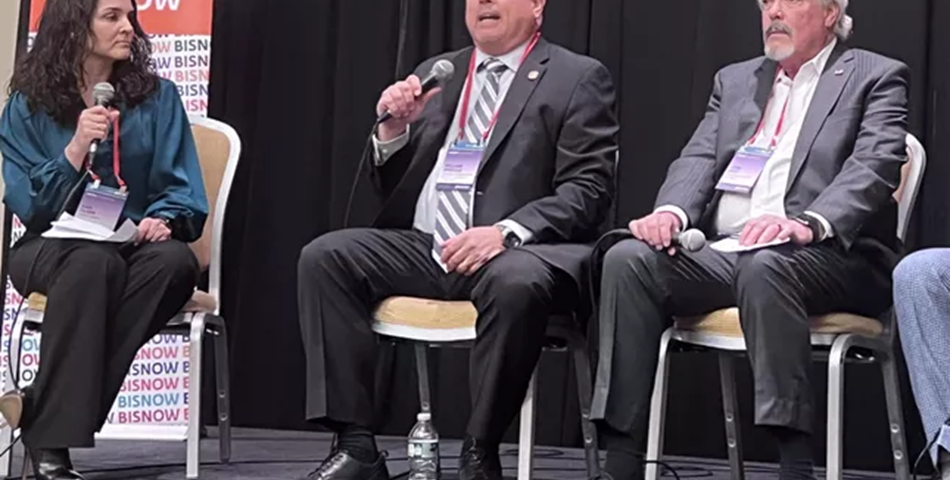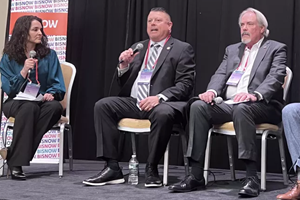For years, the construction industry in Philadelphia and across the country has suffered from a labor shortage — but with construction starts tailing off this year, the epicenter of pain has shifted.
The number of construction job openings fell nationwide by 50% in January, and panelists at Bisnow’s Philadelphia Construction, Development and Design Trends event at the Philadelphia Marriott Downtown on March 21 reported that finding workers has become a little easier over the past few months compared to late 2021 and early last year.
One form of labor shortage is arguably affecting commercial real estate more severely than any others, and it isn’t in construction. Rather, it is in the manufacturing and assembly plants that produce components critical to the infrastructure and operation of buildings, panelists said.
“Do we see any labor shortages? Not at this time,” Gattuso Development Partners Vice President of Construction John Spitz said at the event. “The shortages are actually in the factories. That's why things are so late … For your HVAC systems, your electrical systems, you could be 50 to 80 weeks out.”
Once the post-pandemic construction boom hit full speed, the prices of raw materials such as lumber, steel and concrete shot through the roof. But once the global supply chain became less tangled (and rising interest rates started slamming commercial real estate), most materials prices moderated. But it has become no easier to obtain things like windows or electrical components, to the point where it affects the look and feel of buildings.
“I think it's really important for architects and developers to have heavy design guideline meetings upfront before architects design plans,” Design Pro Development founder and CEO Logan Kramer said. “Architects, GCs and developers all need to understand what materials are out there that are readily available, what materials out there are having problems in the market, and designing around those constraints.”
In a way, the persistence of the construction labor shortage helped lead the industry to this point, as developers sought to reduce the share of construction done on-site by having more and more elements prefabricated, from wall panels to entire bathrooms, all the way to fully modular buildings, Eastern Atlantic States Regional Council of Carpenters Executive Secretary Treasurer William Sproule said.
“We've had to adapt in many ways,” Sproule said. “First off, we had to swallow the big pill that there's not as many man-hours for our membership on projects as there used to be. And we had to embrace the technology rather than fight it.”
Another element that building trades such as carpentry are newly embracing in Philadelphia is diversity, Sproule said — another part of the construction industry where shortages are just as acute as they were a year ago.
Philly’s building trades joined with the Philadelphia 76ers, Hilco Redevelopment Partners, the University of Pennsylvania and other major local institutions in September to form Everybody Builds, a coalition with the goal of centralizing and supercharging efforts to improve minority participation in development and construction.
In the past four years, the Regional Council of Carpenters has seen the share of women in its workforce grow from 14% to 22%, Sproule said, which is in keeping with a nationally observed trend. He did not offer the corresponding number for people of color.
“We really need to look at being more diverse than we are,” Spitz said of the construction industry. “It's about getting the minorities, getting different nationalities and different people into a program that actually builds. That not only helps the community out, but also helps us out, as far as doing what is right. And until we do more along that line, we are missing the boat.”
Building trades have put more resources into recruiting younger workers to training programs that can eventually lead to skilled union jobs, and increased funding and attention from the entities behind Everybody Builds will accelerate those initiatives, Sproule said. It will take time to bear fruit, and until then, it will remain difficult for developers to meet diversity standards sought by community groups and, for projects on city-owned land, mandated by the city itself.
“There's a lot of community meetings I sit in where everyone says, ‘Why aren't people in the community on your job site?’” Kramer said “And I said, “I would love for the community to be on my job site. But unfortunately, from a training aspect, I get a lot of people saying things like, ‘Hey, I'm a demo contractor.’ And for new construction, that's not very helpful.”
The continued insistence of the city on including diversity requirements in its requests for proposals has been a major driving force behind the improving landscape for Black-owned companies in every part of the development ecosystem, BKP Development Group co-founder and Managing Partner Kyle Easley said. But results have been achieved more quickly with pre-construction companies in development and architecture than with construction itself, HBSE Real Estate CEO Jonathan Fascitelli said.
HBSE Real Estate, like its sister company 76 Devcorp, is owned by Philadelphia 76ers parent company Harris-Blitzer Sports & Entertainment. Part of the impetus behind helping form Everybody Builds was to prepare the city’s construction industry to be ready if and when the 76 Place arena proposal begins construction in four years or more, Fascitelli said.
“On the diversity and inclusion front, we're fortunate that we have years until the project opens,” Fascitelli said. “And so that gives us a lot of runway to really work closely right now with the unions and other kinds of contractors to grow capacity so that we can meet aggressive targets and goals for our workforce to be more reflective of the composition of the city.”
Matthew Rothstein, Bisnow Philadelphia













